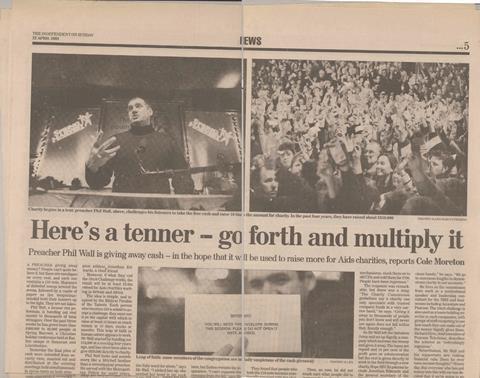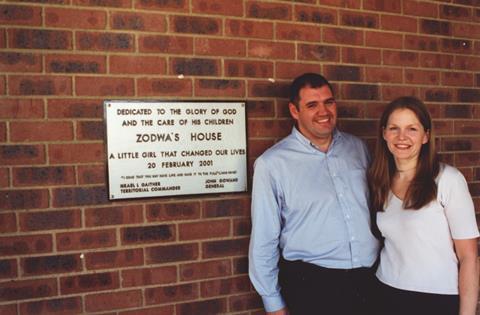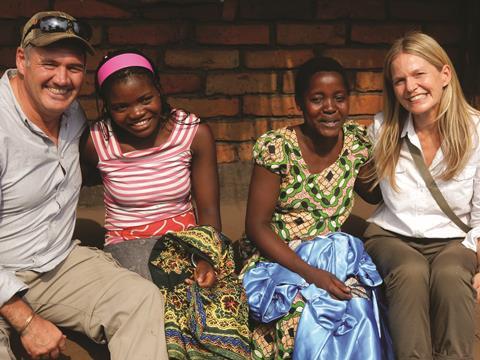Inspired by the parable of the talents, Phil and Wendy Wall MBE distributed free cash at major Christian festivals. Twenty-five years on, they reflect on the many lives changed because of it

With a twinkle in his eye, Phil Wall tells me about the life-changing words he said to his wife, Wendy, during a long-distance telephone call in April 1997. “I’ve fallen in love with another woman, can I bring her home, please?”
The request wasn’t as offensive as it first appears. As part of his work with the Salvation Army, Phil had travelled from London to Ethembeni, a Salvation Army run children’s home in Johannesburg, South Africa. He’d met a toddler there who had been found, abandoned, on their doorstep. With no family of her own, she’d been given the name Zodwa (which means ‘Alone’ in Zulu). Phil felt such a strong connection that he immediately wanted to adopt Zodwa. But would his wife agree?
Adoption
It was a huge decision, with the potential to upend the couple’s family life. Phil and Wendy already had two children of their own and Zodwa was also HIV positive. Phil candidly admits to having thoughts such as: Do we want our house to be the AIDS play date for our kids?
But the couple were in agreement. Phil and Wendy were convinced God was calling them to adopt Zodwa into their family.
A lengthy process began, with the couple first seeking advice from experts and trusted friends. Much prayer, planning and paperwork followed over the coming eight months, until eventually, everything was in place, ready for Zodwa’s arrival. But at the very last minute, social services in South Africa discovered Zodwa had a living grandparent. “The grandma didn’t know that Zodwa existed,” Wendy explains. “It was a wonderful conclusion in that the grandma invited Zodwa to go and live with her. So, it was absolutely the best thing for Zodwa, and we recognised that. But at the same time, we were heartbroken and also confused. We’d really felt this was the path God was taking us on.”
The idea
Zodwa had been staying in Ethembeni with another 60 toddlers – all of whom were orphaned and HIV positive. As the couple worked through their grief, they began to wonder: If we can’t help Zodwa, perhaps we can still do something for the other children. It was the height of the AIDS epidemic – 2.3 million people died from the disease in the year Phil and Wendy were trying to adopt Zodwa.
But in the face of such need, what could one couple do? In explaining what came next, Phil admits that he would love people to conclude that he and his wife were “strategic geniuses” but the truth is that they were heartbroken, and their response was just a gut feeling that they “had to do something”.
Inspired by a sign on the M40 which read: “Welcome to Robin Hood Country” and Jesus’ parable of the talents, Phil devised a plan. First, the couple raided their life savings – around £7,000, which they’d set aside for a house deposit. Then they borrowed another £10,000 from friends. They turned the cash into individual £10 notes. Next, they went to Roots, a Salvation Army conference in Southport. They showed the 1,300 delegates a video, highlighting the plight of AIDs orphans in South Africa and the need to raise funds to help them. Then they handed out one envelope containing a £10 note to everyone gathered.
As the envelopes were opened, Phil told each person they had a choice. They could return their tenner and opt out. Or they could take it as an investment and use their time and talents to turn the £10 into £100 – and donate the proceeds back to Phil and Wendy, who would pass it onto the children’s home. Or, finally: “If you think you need the money more than the little ones in Africa need the money, you can keep it,” said Phil. “We just want you to know it’s not a company’s money or a charity’s money. It’s our life savings, and we’d like you to look after it and make a good decision about how you use it.”
It was a bold move. Yet it worked.
“People did all sorts of things,” Phil says. “Sponsored events, grannies made cakes, people did events at work. There were a lot of worship albums sold on CDs, and some of those albums really shouldn’t have been made,” he jokes.
The couple repeated the initiative – which became known as the 1010 challenge – and soon their initial outlay had come back as a whopping £158,000 in donations.
Momentum was building. Using his connections, Phil went on to distribute cash to thousands more at major Christian events including Spring Harvest and Soul Survivor, as well as conferences run by Pioneer and Newfrontiers in the early 2000s. The vision remained the same: trust people to do the right thing and use their talents, passions and networks to turn their tenner into something greater.

Giving your life savings away is a big shout, but we felt we could trust God for it. And he has been
Over a two-and-a-half-year period, half a million pounds distributed in £10 notes came back as £2m worth of donations from Christians the length and breadth of the country.
We see hope
Most of the money raised was donated to the Salvation Army and other Christian charities. “We worked out pretty quickly that a white middle-class couple in southwest London weren’t going to know the best things to do with the money,” confesses Phil. “So, we started to hire people who actually knew what they were doing.”
Wendy explains that of the 330 million children living in extreme poverty, 71 per cent of them are in sub-Saharan Africa. In the early days, a school was built in Uganda and clinics opened in refugee camps. Eventually, the couple founded a charity, Hope HIV, which later became WeSeeHope (weseehope.org.uk). It has now supported more than 725,000 vulnerable children. But Wendy says that setting up a charity was not the initial aim. “It was about using our skills and resources to make a difference. We couldn’t make a difference in that one life in the way we thought. But we could make a difference in thousands and thousands of other lives.”

Impact
“Our main ambition was to raise money,” continues Wendy. “But what we didn’t account for was the impact on individuals.”
One teenager at Spring Harvest told Phil he had a messy family background, and no one had ever trusted him with money. He said he was going to take his £10 note home, frame it and hang it on his bedroom wall. “To remind myself every day that I’m someone who can be trusted.”
Another lady, who went on to work as a lawyer for a Christian non-governmental organisation that rescued children from sex trafficking, wrote to the couple: “I just want you to know the only reason I’m doing this is because you gave me £10.”
Phil delights in the “upside down kingdom principle” that instead of asking for money, they formed a charity which gave it away. For him, the story is about empowering people – whether unwittingly entrepreneurial fundraisers at Spring Harvest, or children and local communities in South Africa.
Risks
It’s now 25 years since the first 1010 challenge took place. Looking back, Phil has fond memories of what he describes as those early “faith-filled, fun-filled, risky days”.
There were occasions when Securicor vans, containing tens of thousands of pounds in cash, would turn up at Christian festivals and volunteers would stuff envelopes before they were given out at the main sessions. When Securicor quit their involvement, citing the risks involved, Phil simply loaded his own car with £50,000 worth of £10 notes and drove himself to Spring Harvest. “I remember driving down the motorway to Minehead. We were passing all these Little Chef restuarants and we couldn’t stop because we were petrified that if we did, someone would steal the car!
“It was nuts. We were utterly naive at the time, but we were just responding to what we felt God had called us to do. And I think there’s a purity in that.”

The lesson
Phil points out that the 1010 project took place while the couple were “immersed in an emotional journey of grief” over not being able to adopt Zodwa. Why was it so successful? Phil isn’t sure if God “smiled on a creative idea” or if he gave them the creative idea in the first place. “I’ve been a Pentecostal for a long time, and I still haven’t figured that out!” he laughs, before adding, “God spoke to us, he guided us, he held us when we were frightened and confused.
“I look back now with great gratitude that God taught us a lesson: we can trust him. ‘The earth is the Lord’s and everything in it’ (Psalm 24:1). Every single penny we have doesn’t belong to us – we’ve just been entrusted with it. When it’s all of your money, giving it away is quite a big shout. We just felt we could trust God for that. And he has been trustworthy.
“I was reading a devotional, where this lady was facing all sorts of challenges. And she said that in the middle of these difficulties, she made a decision. She would get out of bed each day and say: ‘The answer is “Yes, Lord.” Now, what’s the question?’ I’ve tried to adopt that posture and, in a very uncomplicated and raw way, that’s what we tried to do.”
Did you receive a £10 note at Spring Harvest or another Christian event in the early 2000s? Share your story of what happened at weseehope.org.uk/1010story or email story@weseehope.org.uk





































No comments yet